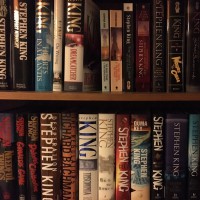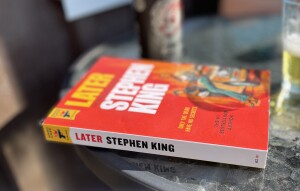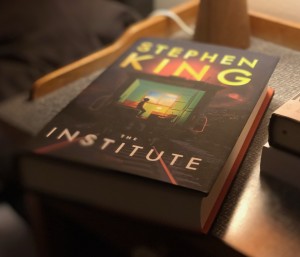Part dark satire about those who “do their own research”, part drama with a strong theme of writing and poetry, part detective thriller with a theme of aging, this is King the commentator and terrifyer rolled into one.
She even has her own novel now, having started out as a supporting character in Mr Mercedes. After the Bill Hodges trilogy, the socially awkward but now significantly happier Holly Gibney carried on in The Outsider and If it Bleeds, and now this.
But in typical King fashion she is nowhere to be seen at the start of the book, set in 2012. Instead we meet a man who we are told won’t live much longer. Then we meet the elderly couple who abduct him. Academics and, apparently, evil. Reading 1793 in parallel makes his troubles seem somewhat tame in comparison but there’s no doubt that he’s in trouble. Being forced to eat raw liver is not the end of it, this we already know.
Then Holly appears, attending a Zoom funeral in the midst of the pandemic, trying to find solace in the fact that “Trump’s gone” but prophetically fearing a 2024 comeback. This time-hopping continues, sending us back to 2015 once we’ve learned that Holly has lost her mother and that King really doesn’t like Donald Trump. And so it goes. The abductee of 2018 is different, managing to get under their skin. We also see this particular episode from the perpetrators’ perspective. Given the obvious pattern, and seeing as how Holly is hired for a missing person case in 2021, it’s not a stretch to guess that Bonnie Dahl, a young librarian, is that year’s victim. But perhaps there’s hope for Bonnie, at least? After all, Holly is on the case. One certainly hopes so upon finding out why the Harrises do what they do.
Holly is simply put a perfect reminder of why I never really tire of the King. Each dialogue echos of the real world, the locations feel like snapshots from said world, which somehow makes it interesting with and without killers. Holly’s approach to everything, part OCD, part genuine attention to detail, is printed on every page. Her general unease in many situations contrasted with her work skills and her interactions with her few but close friends (like the Robinsons, established in previous stories) remain interesting and awkwardly endearing. Besides the case, Holly also has to come to terms with what should be great news but also reveals uncomfortable truths. Interspersed with the present are also numerous flashbacks to a childhood under the thumb of a mother given to belittling her daughter at every turn.
The elderly couple can be as thoughtful and loving toward each other as they are careless about others, which is brilliantly creepy. The glimpses inside their thoughts are not ones into mental hellscapes but rather reveals oddly practical mindsets, not without quirks but certainly not focused on creating suffering for others. They are, above all, utterly selfish in the most concrete way imaginable. The suffering and murder are just byproducts.
Jerome’s visit to the mother of the youngest victim also deserves special mention. King can write well about anything but the way he writes about addicts is peerless. Jerome’s sister Barbara also becomes something of an occasional main character in a book with a sub-theme of poetry. Her meeting with a very old poet is more King than any horrific scene you can think of. The King who delights in honest exchange between different equals and finding the exact right lines. Some of his characters, like the keenly observant Olivia, may be ‘too good’ but they are meant to be, to inspire.
“Do you understand that you are good at this?”
One sub-theme is race. For example Black people getting shot by the police, a topic almost as symptomatic of the early 2020s as Covid. The whole book feels like a snapshot from a time very recent but so dramatic it already feels like history.
Like any detective story, it involves a great many meetings with possible witnesses or other information sources. Each interview, almost, contains the element of Covid. Is the subject vaxxed and masked, are they sceptics or downright scornful?
The premise, taken to a twisted extreme, could be: what if an elderly couple who still love one another decide that it’s their right to do anything to counter the toll of time, to stay sharp and smart and alleviate the ails of age? Their only true loyalty and empathy are for each other. And then make their victims real. King real.
Old age is a theme again, of course, with Olivia’s creaky energy and no-nonsense dedication providing a more inspiring example. In King’s world, decent people say rude things and mean well while bad people watch their language in public.
It works. It always does.
Holly is, just like Mr Mercedes, a detective story where we know whodunnit. The Agatha Christie kind of twist can be found in his work, notably Joyland, but is rarely the most important part. The most important part here is … all the themes he manages to combine in it, plus friendship, suspense and horror.
And it contains the phrase “scimitar smile” which would be a great name for a band if I’ve ever heard one.

 Later is the third King novel published under the Hard Case Crime imprint. Like
Later is the third King novel published under the Hard Case Crime imprint. Like  An airplane, a request that somebody give up their seat for a government agent. Tim
An airplane, a request that somebody give up their seat for a government agent. Tim